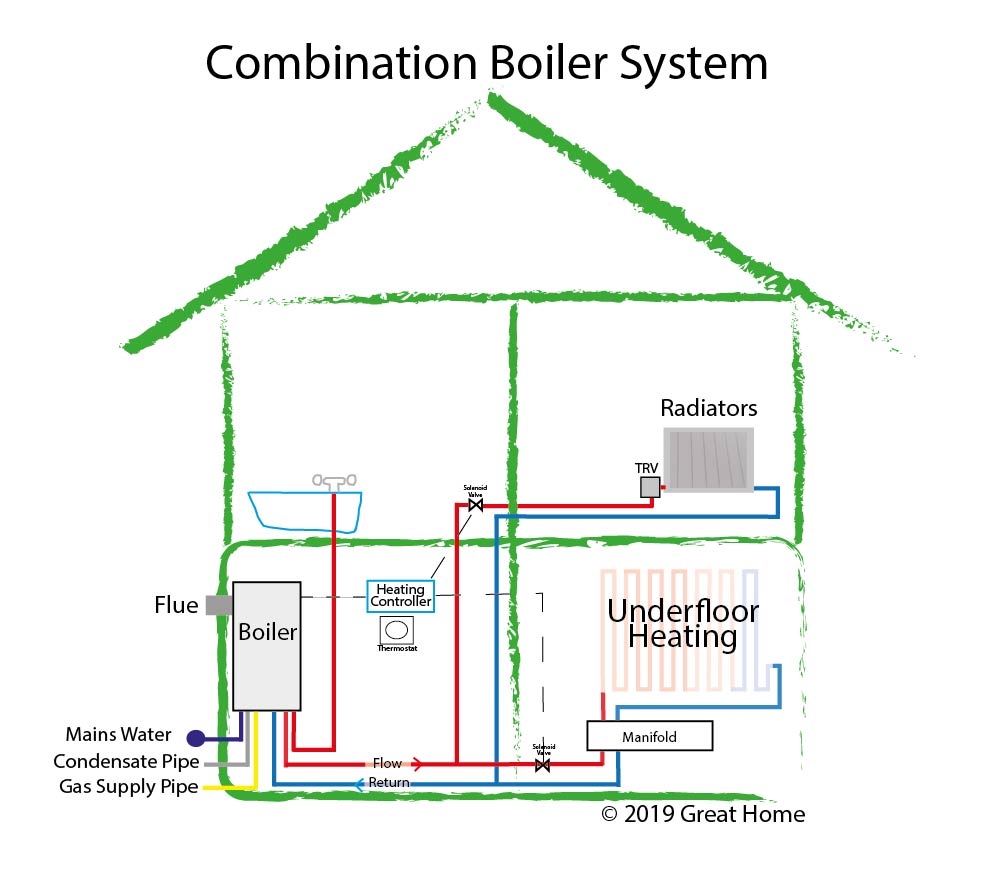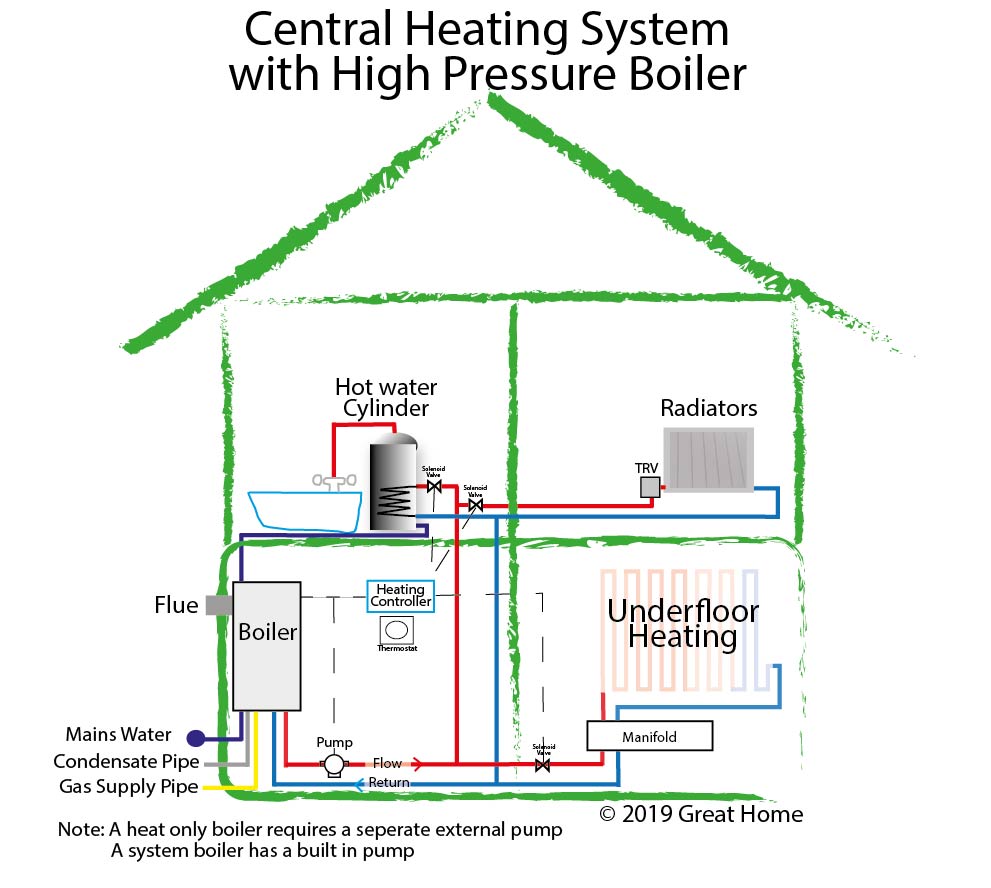When considering a replacement to your gas boiler, it is important to know what type of central heating system you have. There are four main types of central heating systems used in homes:
- Combination Gas Boiler System
- Gravity Fed Gas Boiler System
- High Pressure Gas Boiler System
- Air Source Heat Pump System (uses electricity rather than gas)
The gas boiler systems heat central heating radiators in similar ways. The main differences are the water pressure that the gas boiler operates at and the way hot water is provided. Historically, a gravity system was the main type installed in the UK but for new heating installations this has now been completely replaced by either combination boiler systems, high pressure systems or more recently air source heat pump (Read more about Air Source Heat Pumps).
Combination Gas Boiler System

Combination Boiler System Diagram
Often referred to as a ‘combi boiler’ this type of installation heats hot water as you need it, without the need for a hot water storage tank. So in places where space and hot water requirements are limited, such as flats, these can be very popular systems. The system uses mains water pressure, so there are no overflow tanks.
The major downside is the flow of hot water is slower than systems that provide stored hot water – most systems will struggle to cope with houses with two bathrooms. To have a reasonable level of hot water flow the boiler output has to be in a range of 25-30kW rather than 15-20kW for a system with a hot water storage tank. If you are thinking of using solar water heating in the future then another downside is that these systems are not suitable for use with a combi boiler as they need a hot water cylinder. Read more in our solar panels cost article.
See Combination Gas Boilers for a list of current popular combi boilers with typical consumer prices.
Gravity Fed Gas Boiler System

Central Heating System Gravity Fed System
Historically a gravity fed central heating system was the most common system installed in UK housing. They are less common now as combi and high pressure systems are both superior when a complete new system is being installed.
Many older homes have existing gravity fed systems, so it may be more cost effective to upgrade the existing gravity fed system with a new more efficient boiler rather than go to the expense of a complete new system. Some manufacturers call gas boilers for a gravity system “open vent boilers”, “heat only boilers”, “conventional boilers” or “regular boilers”. Most system boilers can also be used with a gravity system. A system boiler has additional built in components such as a pump which makes installation easier than for a heat only boiler.
The major downsides are:
- The water pressure for hot and cold taps can be quite poor, as the flow depends on gravity. In flats, where there is no opportunity to put the water tanks in a loft, shower water pressure can be poor unless a shower pump is used.
- The extra requirement for a cold water storage tank and an expansion tanks. These tanks were often installed in lofts where they become vulnerable to frost damage resulting in water leaks.
- If the heating system is very old then a condensate pipe, new flue and new gas supply pipe may be required at additional cost. Also in houses the upper and lower floors should be treated as different heating zones and will require a better controller. This can be equally true for older combi and high pressure boilers although they have not been around on the market as long.
High Pressure Gas Boiler System

Central Heating System Diagram with High Pressure Boiler
This type of system operates at mains water pressure and uses a stored hot water system. So if it is lashings of hot water at a forceful pressure you are looking for then this is the system for you.
The main downside is that these high performance systems tend to be more expensive than the combi systems as you have the additional expense of a hot water tank. They also tend to require a higher skill level amongst installers, although as these systems become more common this is less of an issue. Some manufacturers call boilers for a high pressure system with a tank “system boilers” although some heat only boilers can also be used if additional external components such as pumps are added.
Further information
See boiler cost calculator
hot water cylinders.
Hi ,looking for advice we recently had a new combo boiler & radiators fitted its a valiant exotic sustain . It’s mains pressure fed . But the cold water to the bathroom taps are still being fed by our old gravity fed cold water tank in the loft , which is causing problems when using our mixer shower . (Either water goes too hot or too cold can’t get it to mix)Is this plumbed in correctly ..And is there a anything that could be done to resolve this issue..the company who put the system in advised us that nothing could be done to resolve it . Many thanks in advance for your advice
Really appreciate the diagram showing central heating system with high pressure boiler – our imminent installer did a comparatively poor job of explaining everything. Sure we’re gonna get a pressured system but . . . . is this correct – our vented hot water cylinder will in future receive its cold water supply from the mains (italics)?
In the absence of a pressurised system I assume our hw cylinder has been fed with ‘low pressure’ water from our cold water storage tank in the attic. Your help here would be much appreciated.
Hi Graham,
A vented hot water system would not be fed directly by mains pressure cold water. It would usually be fed by a cold water tank in the loft. In some older properties, mainly flats, it was not uncommon to have mains cold water fed to all the taps and outlets but with a vented hot water cylinder still fed from the cold water tank in the loft. A pump would sometimes be added to the hot water outlet from the cylinder, to ensure the pressure for both hot and cold to a mixer shower was similar. I would ask your installer to explain how your existing system operates, what the current pressure is for hot and cold water outlets (mains / gravity) and how it will change when the boiler is upgraded.
Hope this helps
Kind regards
Jon
We had the pressured system installed recently, the hot water cylinder would be directly fed from the mains, so the hot water pressure throughout the house depends on the incoming mains pressure.
Hi Jon,
We have traditional heating systems with Ideal Mexico floor standing boiler and copper tank in the first floor and contemplating replacing with a new energy efficient system and the engineers are advising to keep the current Gravity system and change the boiler and the hot water tank with energy efficient ones unless we are completely revamping the old system with new pipework to the radiators, as they are saying high pressure system might introduce leaks in the old system. As far as Combi some have advised to go with Storage combi with small inbuilt hot water tank from Worcester or Vaillant. Ours is 3 bed with 2 shower rooms, 12 rads including towel rails.
Any suggestions please?
Hi we have a gravity fed system ran from a log burner, the bathroom radiator and small bedroom both upstairs, used to be on when the fire was lit but since having the log burner refurbished this summer the radiators I mentioned remain cold until the pumps are on. I was always led to believe that these are overflow radiators and are warm to stop over heating for safety reasons, so have asked the person who did the burner, why they are no longer warm, he said they should never be hot unless the pumps are on so I’m confused I’ve lived here for over 30 years and it has always been that way. Who is right ? Can you put me out of my misery please. Thank you
Hi
I have a traditional heating system with a cold water tank in the loft and a hot water tank and I am thinking about upgrading this to combi-boiller. What do I need to know when thinking about this.
Please reply to the email
Many thanks
We are in a similar situation and the engineers are advising to keep the Gravity system and change the boiler and the hot water tank with energy efficient ones unless we are completely revamping the old system with new pipework to the radiators, as they are saying high pressure system might introduce leaks in the old system. As far as Combi some have advised to go with Storage combi with inbuilt small hot water tank from Worcester or Vaillant. Ours is 3 bed with 2 shower rooms.
Any suggestions on what you did for yours would be useful please?